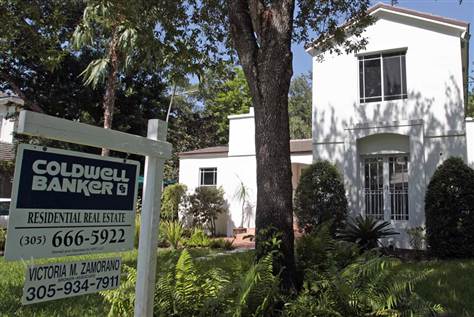Recovery? In these areas, hitting the bottom of will have to come first
The real estate market is already in the deepest depression in modern U.S. history. If you think it can’t get any worse, think again.
In several cities, the real estate market is about to drop even more. Home values in many of those cities, such as Las Vegas, have already collapsed as unemployment has shot higher. And with no hope of quick recovery, housing prices are expected to continue to fall. 24/7 Wall St. identified ten housing markets that are expected to drop by at least another 10 percent by 2012.
Methodology: We used data from the Fiserv Case-Shiller Indexes, which track real estate activity in 380 cities. We selected those that are forecast to have the largest percent price drop between the first quarter of this year and the first quarter of next. We added several other pieces of information to our city-by-city information, including June unemployment levels, median household income, and when home prices are expected to reach their troughs in each market.
Median household income in these cities tended to be near the U.S. median, and in some cases well below. We expected to find high unemployment in these cities. This turned out to be the case. In all but one of the cities we examined, unemployment was well above the national average. The rate was over 18 percent in two of the cities. This link between unemployment and expected future drop in home prices shows again how insidious the housing price problem is.
Home prices fell from all-time highs in 2006. Home equity tapped by second mortgages had been a tremendous source of income then for families who used it for retirement saving, education, and simple consumer purchases. Three years later, many of those homes were worth less than their mortgages. A large population of homeowners still owed a second mortgage. The burden of those two home loans happened to come at a time when national unemployment rose from 4 percent in the mid-2000s to 10 percent. The mix of unemployment and high mortgage payments ripped the home market apart.
The ten markets on the 24/7 Wall St. list of “Housing Markets That Will Collapse This Year,” and several other like them, may not see a full recovery in home prices for years. Inventories in these markets tend to be large. Demand tends to be low as the unemployed cannot be buyers. Finally, fear of further price drops all exacerbate the problem. No person or organization, including the federal government, has been able to help support the housing market, although the administration has tried. Not a single plan has built even a thin net under home values, despite the best efforts of the best economic minds in the world.
10. Fort Lauderdale, Fla.
Expected price drop: -11.1 percent
Median family income: $58,800 (194th highest)
Unemployment rate: 11.8 percent
Median home price: $196,000 (55th highest)
Projected to hit lowest level: Q2 2013
Since 2006, home prices in Fort Lauderdale have dropped by nearly 50 percent. A full 28 percent of that drop occurred in 2009 alone. As was the case throughout most of Florida, the collapse of the housing bubble decimated the construction-based economy. The unemployment rate of nearly 12 percent is evident of the construction sector’s disastrous decline. The value of the 686,000 homes in the Fort Lauderdale area is expected to get even worse through at least the second quarter of 2013. Between Q1 2011 and Q1 2012, the median home price is projected to decline an additional 11.1 percent. Between 2012 and 2013, that number will further decrease by 8.7 percent.
24/7 Wall St.: The 2011 layoff kings
9. Bethesda, Md.
Expected price drop: -11.5 percent
Median family income: $114,100 (the highest)
Unemployment rate: 5.1 percent
Median home price: $417,000 (5th highest)
Projected to hit lowest level: Q3 2012
Bethesda, the extremely wealthy D.C. suburb, has the highest median family income in the country — $114,100. It also has the fifth highest median home price, at $417,000. That position may change, however, as Case-Shiller projects home values will drop by more than $60,000 by next year.
8. Salinas, Calif.
Expected price drop: -11.8 percent
Median family income: $62,100 (145th highest)
Unemployment rate: 12.8 percent
Median home price: $240,000 (34th highest)
Projected to hit lowest level: Q2 2012
Salinas is a small coastal city located 25 miles south of San Jose. Since 2006, the median value of the of the 125,000 houses there decreased in value by more than 61 percent. This is the fourth biggest decline from peak home value among all major American cities. More than 40 percent of this drop occurred in 2009, the year after the housing bubble burst. Unemployment in the city is at 12.8 percent, well above the national average of 9.2 percent. Several companies in the area, including food processing company Romco, expect to continue to lay off workers in the coming months, which should serve to further depress home values.
7. El Centro, Calif.
Expected price drop: -12.1 percent
Median family income: $43,300 (10th lowest)
Unemployment rate: 28.6 percent
Median home price: $130,000 (70th lowest)
Projected to hit lowest level: Q1 2012
El Centro is located five miles from the Mexican border, and is one of the poorest cities in the country. Median income is just $43,300 per family, the tenth-lowest in the U.S. Unemployment is at a staggering 28.6 percent. Between 2006 and 2011, home prices decreased by more than 50 percent. According to a report in the Imperial Valley press, one home was sold in the El Centro area before the recession for $390,000. In 2009, that home was listed at $200,000. Prices are expected to drop an additional 12.1 percent by the first quarter of 2012.
6. Miami, Fla.
Expected price drop: -13 percent
Median family income: $47,800 (32nd lowest)
Unemployment rate: 13.4 percent
Median home price: $175,000 (76th highest)
Projected to hit lowest level: Q2 2013
At 13.4 percent, Miami has one of the highest unemployment rates of any major American city. Home values are above average, but are down by more than 50 percent since 2006. Partially as a result of the staggering unemployment rate, the value of the city’s homes are projected to decrease by another 13 percent by the first quarter of 2013. What’s more disturbing, prices will then likely fall an additional 10.1 percent. If this second drop occurs, it will be by far the greatest depreciation of property values in the country in an area already decimated by current low prices.
5. Merced, Calif.
Expected price drop: -13.2 percent
Median family income: $42,900 (8th lowest)
Unemployment rate: 18.6 percent
Median home price: $112,000 (38th lowest)
Projected to hit lowest level: Q2 2012
Merced has a median family income of just $42,900, placing it among the ten poorest major cities in the country. In 2008, the city’s property lost 46.1 percent of its value. This was the second-greatest depreciation in home value for a city since at least 1980. The city’s median home prices are expected to drop an additional 13.2 percent by the beginning of next year.
4. Detroit, Mich,
Expected price drop: -13.4 percent
Median family income: $49,000 (47th lowest)
Unemployment rate: 12.7 percent
Median home price: $42,000 (the lowest median home price)
Projected to hit lowest level: Q2 2012
Since the recession began, Detroit has been the horror story for plummeting home values, foreclosures, vacancies, and unemployment. To date, Detroit’s median home price of $42,000 is the lowest among all 385 major metropolitan areas. While the motor city has been languishing for some time before the recession, the drop in home value has been more steady, as opposed to the rapid drop-offs seen in cities in Florida, Nevada, and California. Detroit’s already record-low values are expected to drop an additional 13.4 percent by the first quarter of 2012.
3. Las Vegas, Nev.
Expected price drop: -13.9 percent
Median family income: $58,900 (196th lowest)
Unemployment rate: 12.4 percent
Median home price: $140,000 (90th lowest)
Projected to hit lowest level: Q4 2012
Las Vegas was one of the center points of the meteoric growth in the first half of the 2000s, only to be followed by a catastrophic fall in the second half. Between 2008 and 2011, home prices in the city dropped by 42.3 percent, the second greatest decline in the country. Although home values in the city are already more than 58 percent off their peak, they are projected by Case-Shiller to drop an additional 13.9 percent by Q1 2012, and then 6.3 percent more by Q1 2013.
2. Riverside-San Bernardino, Calif.
Expected price drop: -15.6 percent
Median family income: $59,700 (190th highest)
Unemployment rate: 13.7 percent
Median home price: $181,000 (70th highest)
Projected to hit lowest level: Q1 2012
Like so many industrial cities in California, Riverside-San Bernadino is being affected by the recession and housing crisis more than most other parts of the U.S. Unemployment has hit 13.7 percent, home vacancy and rental vacancy rates are high, and home values are plummeting. Median home prices are down more than 55 percent from their peak in 2006. By the beginning of next year, prices are expected to drop an additional 15.6 percent, or nearly $30,000.
1. Naples, Fla.
Expected price drop: -16.6 percent
Median family income: $62,800 (137th highest)
Unemployment rate: 10.5 percent
Median home price: $225,000 (40th highest)
Projected to hit lowest level: Q4 2012
Like much of southwest Florida, Naples was one of the fastest-growing communities in the country as it prepared for the millions of baby boomers on the cusp of retirement. When the housing bubble burst, however, the thousands of construction projects for condominiums and retirement communities were halted or lost money, and home values plummeted. From peak home value in 2006, prices dropped by 55 percent. They are expected to keep falling through next year more than any major city in the country. By Q1 2012, home values will drop an additional 16.6 percent, or nearly $40,000.
Michael B. Sauter, Douglas A. McIntyre, msnbc.msn.com “Read Full Story”
At Gay Real Estate, we keep you posted about all the residential real estate news affecting the LGBT community coast to coast, and in your neighborhood.
Click here for list of gay realtors, lesbian realtors and gay friendly realtors Nationwide.
If you have a real estate story that you’d like to share with us with the LGBT community, please contact us at: manager@gayrealestate.com



